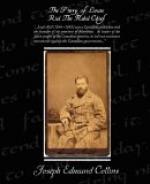“O, big feasts, big feasts,” was the reply. “Plenty fat cattle in the corals; and heaps of mange in the store.” So the Salteaux were happy, and, somewhat in their old fashion, went vaulting homewards.
Tidings of fight, and feast, and turmoil reached the Crees, and they sallied out from the tents, while the large-eyed squaws sat silently reclining, marvelling what was to come of it all. High into the air the Nez Perce thrust his nostril; for he had got the scent of the battle from afar. And last, but not least, came the remnant of that tribe whose chief had shot Custer, in the Black Hills. The Sioux only required to be shown where the enemy lay; but in his enthusiasm he did not lose sight of the fat cattle grazing upon the prairies.
These, however, were only the first impulses of the tribes. Many of them now began to remember that the Government had shown them many kindnesses, given them tea and tobacco, and blankets; and provided them with implements to plough the lands, and oxen to draw the ploughs. And some of the chiefs came forward and said “You must not fight against the Great Mother. She loves the Indians. The red man is well treated here better than away south. Ask the Sioux who lived down there; they tell you maybe.” Such advice served to set the Indians reflecting; but many hundreds of them preferred to hear Louis Riel’s words, which were:—
“Indians have been badly treated. The Canadian Government has taken away their lands; the buffalo are nearly all gone, and Government sees the red men die of starvation without any concern. If you fight now you will make them dread you; and then they will be more liberal with you. Besides, during the war, you can have plenty of feasting among the fat cattle.” A hellish war-whoop of approval always greeted such words.
At length the rising came. Gabriel Dumont, Riel’s lieutenant, a courageous, skilful half-breed, possessed of a sound set of brains, had drilled several hundreds of the Indians and half-breeds. Armed with all sorts of guns, they collected, and stationed themselves near Duck Lake.
“My men,” Dumont said, “You may not have to fight, for the officers may agree to the demand which I shall make of them on behalf of the Indians and the half-breed people. But if they refuse, and insist on passing, you know for what purpose you have taken arms into your hands. Let every shot be fired only after deliberate aim. Look to it that you fire low. After you have strewn the plain with their dead, they will go away with some respect for us. Then they will send out Commissioners to make terms with us. In the meantime the success of our attack, will bring hundreds of timid persons to our standard.” This harangue was received with deafening cheers.




